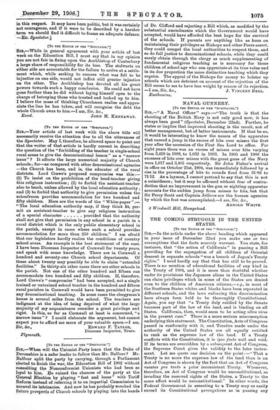pro THE EDITOR OF THE "Srscueros."3 SIR, — Your article of last
week with the above title will necessarily receive the attention due to all the utterances of the Spectator. May I, therefore, be allowed space to point out
that the writer of that article is hardly correct in describing the question of the "forbidding of the teacher in single-school rural areas to give the denominational lesson" as a "narrow issue" ? It affects the large numerical majority of Church schools ; for—as compared with other denominational agencies —the Church has been, and is, the educator of the rural districts. Lord Crewe's proposed compromise was this :— (1) To insist on the prohibition of the head-teacher giving this religious instruction ; (2) to forbid the assistant-teacher also to teach, unless allowed by the local education authority ; and (3) to forbid that authority to give permission unless the schoolroom provides accommodation for two hundred and fifty children. Here are the words of the " White-paper ":— "The local education authority may, if they think fit, per- mit an assistant-teacher to give any religious instruction of a special character provided that the authority shall not give that permission in any school in a parish in a rural district which is the only public elementary school in
the parish, except in cases where such a school provides accommodation for more than 250 children." I am afraid
that our legislators hardly realise the conditions of country school areas. An example is the best statement of the case. I have been Diocesan Inspector of Cornwall for twenty years, and speak with some knowledge. There are in Cornwall a hundred and seventy-one Church school departments. Of these about twenty may possibly be able to claim "extended
facilities." In thirty-six other cases there are other schools in
the parish. Not one of the other hundred and fifteen can accommodate two hundred and fifty children. If, therefore, Lord Crewe's " compromise " had been accepted, not a single trained or untrained school teacher in the hundred and fifteen rural parishes in Cornwall would have been permitted to give any denominational teaching. In some oases the clergyman's
house is several miles from the school. The teachers are indignant at the idea of being deprived of what the large
majority of my acquaintance consider a great privilege and right. Is this, so far as Cornwall at least is concerned, "a narrow issue " ? I could elaborate the argument, but cannot expect you to afford me more of your valuable space.—I am, Plymouth. Diocesan Inspector, Truro.


































 Previous page
Previous page